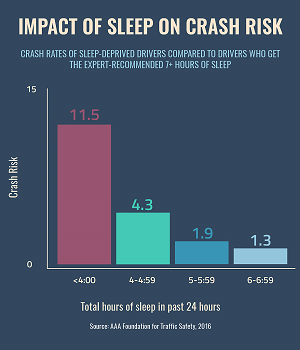Missing 1-2 hours of sleep can DOUBLE your risk of a car crash.
We all felt the strain of losing that hour of sleep this weekend with Daylight Savings Time. But are you aware that insufficient sleep is becoming a public health concern? The National Institute of Health recommends that healthy adults should sleep for seven to eight hours a day. However, according to the Center for Disease Control and Prevention (CDC), 35% of U.S. drivers are sleeping less than that.
Drowsy driving is involved in more than one in five fatal crashes each year. The AAA Foundation for Traffic Safety released a new study revealing the direct correlation  between sleep deprivation and motor vehicle crash involvement:
between sleep deprivation and motor vehicle crash involvement:
This is the same crash statistic associated with driving under the influence of alcohol. The impact that drowsy driving has on traffic safety cannot be underestimated.
Sleepiness can slow down your reaction time and impair your judgement while behind the wheel. Symptoms of drowsy driving can include: difficulty keeping your eyes open, drifting out of your lane and not remembering the last few miles driven. It is important to prioritize sleep and maintain a healthy sleep schedule so you do not put yourself or others on the road at risk.
To prevent drowsiness behind the wheel:
- Maintain a healthy sleep schedule (minimum of 7 hours per night)
- Avoid medication that can cause drowsiness or impairment before driving
- Stop for breaks on long trips
- Travel with an alert passenger and take turns driving
The way to avoid drowsy driving is to refrain from overextending yourself and knowing your body’s limits. Drunk driving is a well-known danger on the road, but drowsy driving can lead to similar behaviors and, unfortunately, similar outcomes.






